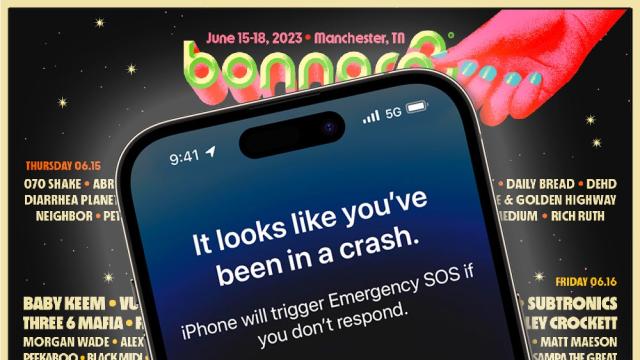There’s bound to be a few extra emergency calls when 80,000 people descend upon your city for a weekend music and arts festival, but according to authorities in Coffee County, Tennessee, the iPhone 14’s automatic crash detection was responsible for a spike in false 911 calls at Bonnaroo as it mistook revelers’ enthusiastic dancing for car crashes.
As Apple continues to push its smartphones and wearables as health and safety devices, the iPhone 14, iPhone 14 Pro, Apple Watch Series 8, Apple Watch Ultra, and the 2nd gen Apple Watch SE were all upgraded with the ability to leverage their motion sensors to detect sudden and strong movements, which can be an indicator that the person holding or wearing the device has been involved in a crash of some sort.
When the Apple Watch or iPhone suspects that a crash has occurred, it provides on-screen as well as audible alerts, either through voice prompts or haptic taps, and presents the user with an Emergency Call slider so they can easily contact emergency services, or dismiss the alert altogether if it was a false positive. However, as an additional potential life-saving precaution, if the user doesn’t respond to the alert prompt after 20 seconds, implying they could be unconscious, the device contacts emergency services automatically, and shares the location data.
It’s a feature that can potentially save lives, but also one that could potentially benefit from some refinement, as according to the Nashville ABC affiliate WKRN, during the Bonnaroo Music and Arts Festival in Manchester, Tennessee, the local Coffee County authorities had to deal with “about five times the amount of false 911 calls than average,” resulting from Apple devices incorrectly recognising partying and dancing as car crashes.
Thankfully, that wasn’t enough false 911 calls to overwhelm the local system and prevent responders from dealing with real emergencies that weekend, and with the help of festival organisers, the local authorities were able to locate the source of every false 911 call to determine that no actual emergencies were being reported.
According to WKRN, Apple offered to send representatives to Manchester to help resolve the issue, but the solution was to simply send localised alerts, including a statement made by the local police through Twitter, encouraging festival goers to temporarily deactivate the Crash Detection feature, which reduced the number of 911 calls by 40 to 60%.
Similar problems have occurred with iOS before. In January and February, ski patrols across the US and Europe reported a slew of false emergency calls on the slopes after Apple introduced the Fall Detection feature to Apple Watch.
Police in the United Kingdom have likewise reported false emergency calls made by Android devices in recent weeks via the Emergency SOS feature on Android 12, with a spike over this past weekend.
Although Apple goes out of its way to publicise when its emergency assistance feature like Crash Detection work and are responsible for saving lives, incidents like this help illustrate that handing everything off to the machines isn’t a future we’re ready for just yet, as the algorithms endlessly processing and analysing the data we produce seem to be making mistakes more often than the companies behind them are letting on.
